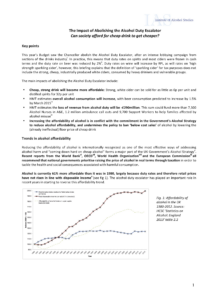View this report

Key points
This year’s Budget saw the Chancellor abolish the Alcohol Duty Escalator, after an intense lobbying campaign from sections of the drinks industry. In practice, this means that duty rates on spirits and most ciders were frozen in cash terms and the duty rate on beer was reduced by 2%. Duty rates on wine will increase by RPI, as will rates on ‘high strength sparkling cider’, however, this briefing explains that the definition of ‘sparkling cider’ for tax purposes does not include the strong, cheap, industrially produced white ciders, consumed by heavy drinkers and vulnerable groups.
The main impacts of abolishing the Alcohol Duty Escalator include:
- Cheap, strong drink will become more affordable: Strong, white cider can be sold for as little as 6p per unit and distilled spirits for 32p per unit
- HMT estimates overall alcohol consumption will increase, with beer consumption predicted to increase by 1.5% by March 2015
- HMT estimates the loss of revenue from alcohol duty will be -£290million. This sum could fund more than 7,300 Alcohol Nurses in A&E, 1.2 million ambulance call outs and 9,700 Support Workers to help families affected by alcohol misuse
- Increasing the affordability of alcohol is in conflict with the commitment in the Government’s Alcohol Strategy to reduce alcohol affordability, and undermines the policy to ban ‘below cost sales’ of alcohol by lowering the (already ineffectual) floor price of cheap drink
View this report
